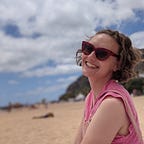Vizzuality is moving!
Vizzuality is leaving Madrid! It was a hard choice to make but living in Madrid has got harder and more dangerous for our team. Three teammates went to hospital for heatstroke this summer. Another two were injured in rioting at water collection points. We’re leaving with heavy hearts but know its the right choice.
Our new home will be the beautiful seaside city of Coruña in northern Spain. The climate there is how it used to be in Madrid, just a little wetter. We’re sure our team will feel right at home. We’re looking forward to getting on our surfboards, as soon as the latest jellyfish outbreak is over.
We knew this day would come. In 2019 we worked with the World Resources Institute to develop the Aqueduct Water Risk Atlas. We were shocked to see that Madrid and most of southern Spain was already experiencing extremely high water stress. We’d seen that our local reservoir was drying out, but there’s nothing like hard data to wake you up to reality.
Moving home is a big deal, both emotionally and financially. To make it a little easier for our team and their families, we have experts on hand to help with the paperwork and house hunting. We’re also throwing a big party before we go, so we can say goodbye to all our friends and neighbours.
Wish us well in our new home, we hope it’s another 20 years before we have to move again!
Camellia Williams, 1 September 2029.
The present day. 9 August 2019.
We’re not really moving…not yet anyway.
We’ve been visualising climate data for 10 years, but the stark reality of climate change still shocks us. This week the launch of the Aqueduct Water Risk Atlas made us think seriously about Vizzuality’s future here in Madrid. What would happen if the city ran out of water? Where would we go if extreme temperatures and wildfires made it impossible for us to live here?
We’ve seen how drought can lead to severe water restrictions, but that’s not all. It affects food security, energy production, and the manufacture of just about everything we use in our everyday lives. Water scarcity can trigger political instability, civil unrest, displacement and migration. The effects can ripple across borders. We joke about leaving our home in Madrid, but it could be a reality for millions across the world.
Climate change is exacerbating the pressure on our precious water sources. How we deal with it now will determine how bad things will get. Our governments cannot continue ignoring the huge red flags waving in their faces. Our Madrileño’s teased our Cambridge teammates for complaining about a three day heat wave that peaked at 38.8C. But we all knew that Cambridge should never be as hot as Madrid.
Average temperatures across the globe are set to rise, even if we take dramatic action right now to reduce carbon emissions. In Madrid, our average summer temperature will increase by 2.9C by 2100. But that’s the best-case scenario. In the worst-case scenario, the average summer temperature will increase by 8.7C, from 25.9C to 32.8C. Sure, that might sound ok, but trust me when I say people get very grumpy when they can’t sleep in the summer heat. What’s more, lack of sleep can have serious consequences for our health.
The most vulnerable are most at risk.
Ultimately, it will be the most vulnerable who are worst affected by climate change and water scarcity. The World Bank predicts that 143 million people will be forced to migrate. Decreasing crop productivity, water shortages, and rising sea levels will all impact the poorest people. Here in Madrid we still have time to act, but for others the migration has already started.
Governments, businesses and organisations need data. Data that helps them understand where and how their support is needed. Platforms like Aqueduct provide that data in ways that make them easier to understand and use. For example, 3 in 10 people lack access to safe drinking water services (UN), and Aqueduct maps where they are.
Act now for the future.
We don’t want to leave Madrid, so we’re putting all our energy into making sure we don’t have to. That’s why we partner with organisations that are working hard to make this world a better place. Together we’re opening up access to knowledge. Knowledge we can use to make choices that are good for people and our planet.
